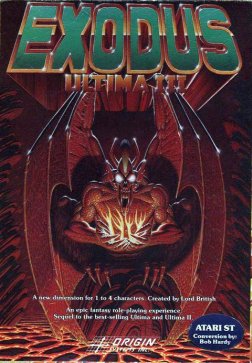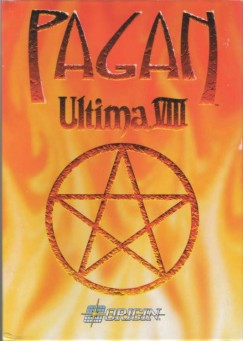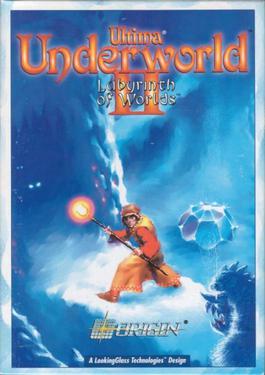
Ultima is a series of open world fantasy role-playing video games from Origin Systems, created by Richard Garriott. Electronic Arts has owned the brand since 1992. The series had sold over 2 million copies by 1997.

Richard Allen Garriott is a British-born American video game developer, entrepreneur and private astronaut.

Looking Glass Studios, Inc. was an American video game developer based in Cambridge, Massachusetts. The company was founded by Paul Neurath with Ned Lerner as Blue Sky Productions in 1990, and merged with Lerner's Lerner Research in 1992 to become LookingGlass Technologies. Between 1997 and 1999, the company was part of Intermetrics and was renamed Looking Glass Studios. Following financial issues at Looking Glass, the studio shut down in May 2000.

Origin Systems, Inc. was an American video game developer based in Austin, Texas. It was founded on March 3, 1983, by Richard Garriott and his brother Robert. Origin is best known for their groundbreaking work in multiple genres of video games, such as the Ultima and Wing Commander series. The company was purchased by Electronic Arts in 1992.

Akalabeth: World of Doom is a role-playing video game released in 1979 for the Apple II. It was published by California Pacific Computer Company in 1980. Richard Garriott designed the game as a hobbyist project, which is now recognized as one of the earliest known examples of a role-playing video game and as a predecessor of the Ultima series of games that started Garriott's career. Garriott is the sole author of the game, with the exception of title artwork by Keith Zabalaoui.

Warren Evan Spector is an American role-playing and video game designer, director, writer, producer and production designer. He is known for creating immersive sim games, which give players a wide variety of choices in how to progress. Consequences of those choices are then shown in the simulated game world in subsequent levels or missions. He is best known for the critically acclaimed video game Deus Ex that embodies the choice and consequence philosophy while combining elements of the first-person shooter, role-playing, and adventure game genres. In addition to Deus Ex, Spector is known for his work while employed by Looking Glass Studios, where he was involved in the creation of several acclaimed titles including Ultima Underworld, Ultima Underworld II, System Shock, and Thief: The Dark Project. He is employed by OtherSide Entertainment, where he was part of the development team for now-cancelled System Shock 3. He is currently working on a new immersive sim based on an original intellectual property.
Chuck Bueche is a video game programmer best known for co-founding Origin Systems and his involvement with the Ultima video game series.

Harvey Smith is an American video game designer and writer, working at Arkane Studios.

Ultima III: Exodus is the third game in the series of Ultima role-playing video games. Exodus is also the name of the game's principal antagonist. It is the final installment in the "Age of Darkness" trilogy. Released in 1983, it was the first Ultima game published by Origin Systems. Originally developed for the Apple II, Exodus was eventually ported to 13 other platforms, including a NES/Famicom remake.

Ultima VIII: Pagan is a role-playing video game, released as the eighth part of the Ultima series. Released in 1994, it is a DOS-only title and is also the first game in the series to be rated M in North America. It was not as well-received as its predecessors, Ultima VII and Ultima VII Part Two: Serpent Isle.

Ultima IX: Ascension is a 1999 role-playing video game developed by Origin Systems and published by Electronic Arts for Microsoft Windows. It is the ninth and final main installment of the Ultima series.

Ultima VII Part Two: Serpent Isle is a role-playing video game released in 1993 as part of the core Ultima series, its story beginning eighteen months after the conclusion of Ultima VII: The Black Gate. In Serpent Isle, the Avatar follows Batlin to the eponymous land called Serpent Isle, finding three city-states founded by those who left Britannia generations before and ancient ruins from a still-older lost civilization that was there long before them.

Ultima Underworld: The Stygian Abyss is a first-person role-playing video game developed by Blue Sky Productions and published by Origin Systems. Released in March 1992, the game is set in the fantasy world of the Ultima series. It takes place inside the Great Stygian Abyss: a large cave system that contains the remnants of a failed utopian civilization. The player assumes the role of the Avatar—the Ultima series's protagonist—and attempts to find and rescue a baron's kidnapped daughter.

Ultima Underworld II: Labyrinth of Worlds is a 1993 first-person role-playing video game developed by LookingGlass Technologies and published by Origin Systems. As the sequel to Ultima Underworld: The Stygian Abyss, the game is set in the Ultima fantasy universe. Players assume the role of the Avatar—the protagonist of the Ultima series—and adventure through multiple dimensions while seeking to prevent the evil Guardian from achieving world domination. Progression is largely nonlinear and the game allows for emergent gameplay.

Entomorph: Plague of the Darkfall is a 1995 action-adventure role-playing video game by Strategic Simulations, Inc. It was re-released in 2013 on GOG.com.
Kirk Winterrowd is an American video game music composer and musician, best known for his work for Origin Systems, namely several of the Ultima titles. He also served as a voice actor in Ultima VIII: Pagan.
Denis Loubet is an artist who has worked on several pen-and-paper role-playing games and video games, including the MMORPG Ashen Empires.

Scorpia is the pseudonym of a video game journalist who was active from the early 1980s through the late 1990s. She wrote for Computer Gaming World, reviewing role-playing video games and adventure games. Scorpia was known for her harsh criticism of video games she disliked. She was fired after CGW was sold to Ziff-Davis in 1999, and subsequently retired from games journalism. Her pseudonym is based on a character she created in a role-playing game.
Wolfgang Engel is a videogame designer. He is the founder and CEO of Confetti. Previously he also worked as the Lead Graphics Programmer for Rockstar Games. He is also the founder and editor of ShaderX and GPU books series.












